Reflections
Leading in new ways

We are grateful for generous friends of BJC over many decades who have supported our work, allowing us to make these critical investments so we can ensure that our messaging meets the times. Our mission-focused programs have not changed dramatically since our last branding refresh or website design, but the world in which we work has. Telling the story of why we support faith freedom for all in a visually engaging and digitally fluent way is crucial to achieving our goals.
We have wasted no time in putting our new brand and tools to use. This summer, we created and coordinated the introduction of a new platform for individual and collective action. Christians Against Christian Nationalism provides a place for anyone who self-identifies as a Christian to take a public stand by signing a statement at ChristiansAgainstChristianNationalism.org. (You can read more about the genesis of this idea, the full statement of unifying principles and words of some of our endorsers on pages 10-13 of this magazine.) We are pushing back against an insidious ideology, which tends to conflate political authority with religious authority and implies that to be a true American, you must be a Christian.
In talking with reporters and others interested in the statement, one of the questions we’ve been repeatedly asked is what we hope it accomplishes.
I hope Christians like me can find a place to go “on record” about their concerns with the threats Christian nationalism poses — not only to our country, but also to our faith. Jemar Tisby, whom I spoke with as part of the BJC Podcast’s special series on Christian nationalism, told me that he, as a historian, knows how important it is that we create records for the future — showing there were people willing to take a public stand when they saw something that wasn’t right.
I hope this project provides a more accurate picture of how people of faith approach this topic. Some people may assume that all — or at least, most — Christians want to see their faith propped up by the government. But, a review of the thousands of names on the list (as I write, more than 15,000 Christians from dozens of denominations are listed on the website) shows that the unifying principles in the statement are bringing together a diverse cross-section of Christians who are standing up to Christian nationalism.
I hope we help start conversations. Some of the immediate and helpful feedback we got from advocates who shared the campaign with their social media networks showed me how many gaps in understanding we have within the Christian community about Christian nationalism. We don’t claim to have all the answers, but if we can help raise some helpful and humble questions and provide opportunities for civil dialogue, we might be able to make some headway against some deeply entrenched myths about the founding of the country and the role of civil religion, which has often been assumed to be largely harmless but in reality might be adding to our divisions.
I look forward to hearing your stories about how Christian nationalism shows up in your communities as I travel this fall for a series of advocacy trainings. We will discuss strategies on how best to communicate with our elected officials and with our neighbors about religious freedom for all. I am grateful for your partnership, particularly at this pivotal time.
Amanda Tyler is executive director of BJC.
This column appeared in the fall 2019 edition of Report from the Capital. You can read the entire magazine as a PDF or a digital flip-through edition.




